Coenzyme Q10 Supplement For Fertility
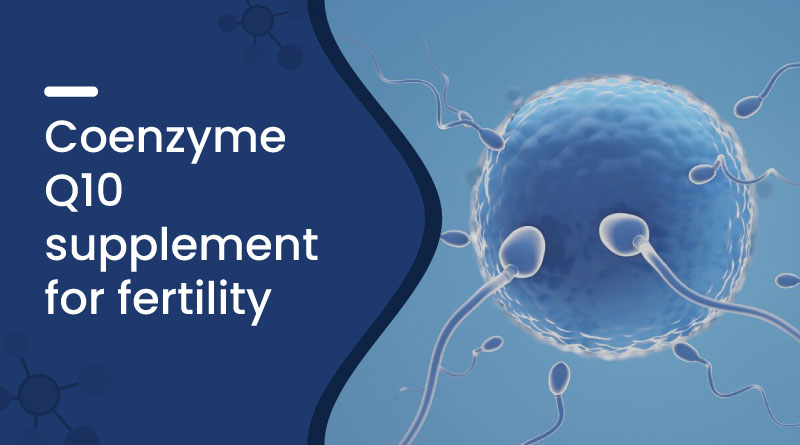

When it comes to boosting fertility, many people turn to natural supplements for help. One such supplement gaining attention is Coenzyme Q10, or CoQ10. Whether you're a man or a woman trying to improve fertility, CoQ10 has shown promising benefits in supporting reproductive health. In this blog, we will explore how CoQ10 works, its benefits for fertility, and how it can help both men and women achieve their fertility goals.
What is Coenzyme Q10 (CoQ10)?
Coenzyme Q10, often referred to as CoQ10, is a naturally occurring antioxidant found in every cell of your body. It plays a crucial role in energy production within cells, which is essential for cellular function. CoQ10 also helps protect the body from oxidative stress, which can cause damage to cells and tissues.
As we age, the levels of CoQ10 in our body decrease, which may affect various aspects of health, including fertility. Because of its antioxidant properties and role in cellular energy, CoQ10 has become a popular supplement for improving reproductive health.
How Does CoQ10 Help with Fertility?
CoQ10 plays a vital role in improving fertility due to its powerful antioxidant properties and its effect on cellular energy. By supporting energy production in cells, CoQ10 helps enhance the health of reproductive cells and may improve overall fertility. Here's how CoQ10 can positively influence fertility in both men and women:
CoQ10 for Fertility in Women
For women, CoQ10 can have a profound effect on egg quality. As women age, the quality of their eggs naturally declines, which can impact their ability to conceive. CoQ10 helps by improving the energy levels in egg cells, reducing oxidative stress, and enhancing their overall quality. Studies have shown that women who take CoQ10 supplements may have better ovarian reserve and a higher chance of pregnancy, especially those undergoing fertility treatments like IVF.
Additionally, CoQ10 may improve the function of the mitochondria within the egg cells. Mitochondria are responsible for providing energy to the cell, and better mitochondrial function can enhance egg quality and overall fertility.
CoQ10 for Fertility in Men
CoQ10 is equally beneficial for men when it comes to fertility. For men, CoQ10 helps improve sperm quality by increasing sperm count, motility, and morphology. Research suggests that CoQ10 can boost the energy needed for sperm to swim and fertilize an egg, improving the chances of conception. CoQ10 also reduces oxidative stress in the sperm, which can improve their quality and reduce the risk of DNA damage.
Men facing fertility challenges such as low sperm count or poor sperm motility may find CoQ10 supplementation particularly helpful. By supporting healthy sperm production and function, CoQ10 can be a game-changer in the fertility journey.
Benefits of CoQ10 for Fertility
There are several benefits of adding CoQ10 supplements to your fertility regimen. Some of the most notable benefits include:
- Improved Egg Quality: CoQ10 supports better egg quality in women, especially those over 35 years old.
- Enhanced Sperm Quality: CoQ10 improves sperm count, motility, and morphology in men.
- Oxidative Stress Reduction: As a powerful antioxidant, CoQ10 reduces oxidative damage to eggs and sperm, improving reproductive health.
- Increased Fertility Treatment Success: CoQ10 can improve the success rates of fertility treatments like IVF and IUI.
- Energy Boost for Reproductive Cells: CoQ10 provides the energy needed for optimal egg and sperm function.
How to Take CoQ10 for Fertility?
The recommended dosage of CoQ10 for fertility depends on the individual and their specific needs. However, typical dosages range from 100mg to 600mg per day. It’s always best to consult with a healthcare professional before starting any supplementation, especially when it comes to fertility.
CoQ10 supplements come in various forms, including soft gels, capsules, and powders. Some people prefer to take CoQ10 with food, as this can enhance absorption. Make sure to choose a high-quality CoQ10 supplement that is easily absorbed and suitable for your needs.
Potential Side Effects of CoQ10
CoQ10 is generally considered safe when taken in appropriate doses. However, some individuals may experience mild side effects, including:
- Headaches
- Upset stomach or nausea
- Insomnia (if taken too late in the day)
- Diarrhea
If you experience any severe or persistent side effects, it's important to stop taking the supplement and consult a healthcare professional. CoQ10 may also interact with certain medications, such as blood thinners, so make sure to discuss its use with your doctor if you’re on any medication.
Conclusion: Is CoQ10 the Right Supplement for You?
CoQ10 can be an effective supplement for improving fertility in both men and women. Its antioxidant properties help support healthy reproductive cells, reduce oxidative stress, and boost overall fertility. Whether you're dealing with age-related fertility decline or fertility issues like low sperm count or poor egg quality, CoQ10 can offer significant benefits.
If you're considering adding CoQ10 to your fertility plan, always consult with a healthcare professional to ensure it’s safe and suitable for you. With the right dosage and a consistent approach, CoQ10 may be just the support you need on your fertility journey.
Actionable Tips for Fertility Support
- Take CoQ10 consistently with food to enhance absorption.
- Consult your healthcare provider before starting CoQ10, especially if you're taking any medications.
- Incorporate a healthy diet and lifestyle to further support fertility.
- Give yourself time, as fertility improvements can take a few months.
Remember, every fertility journey is unique, and what works for one person may not work for another. Stay patient and explore the options that work best for you!
Frequently Asked Questions (FAQs) About CoQ10 for Fertility
Q: What is CoQ10 and how does it help with fertility?
A: CoQ10, or Coenzyme Q10, is a powerful antioxidant that supports cellular energy production. In fertility, it helps improve egg and sperm quality by reducing oxidative stress and boosting energy levels in reproductive cells, thus enhancing fertility in both men and women.
Q: Can CoQ10 improve fertility in women?
A: Yes, CoQ10 improves egg quality, especially in women over 35. By enhancing mitochondrial function in eggs, CoQ10 helps reduce age-related fertility issues. It also supports women undergoing fertility treatments like IVF by improving ovarian reserve and egg quality.
Q: Is CoQ10 beneficial for fertility in men?
A: Absolutely. CoQ10 improves sperm quality by increasing sperm count, motility, and morphology. It also reduces oxidative stress, making sperm more capable of fertilizing an egg. Men with low sperm count or motility problems may find CoQ10 particularly helpful.
Q: Are there any side effects of CoQ10?
A: CoQ10 is generally safe, but some people may experience mild side effects such as headaches, nausea, or stomach upset. If you have concerns or take medications (e.g., blood thinners), it's best to consult your doctor before using CoQ10.
Q: How long does it take to see results from CoQ10 for fertility?
A: Results vary depending on the individual, but it can take a few months for CoQ10 to show improvements in egg and sperm quality. It's recommended to take CoQ10 for at least 2 to 3 months to start noticing changes. Patience is important for this process.
Q: Can I take CoQ10 with other fertility supplements or treatments?
A: Yes, CoQ10 can generally be taken alongside other fertility supplements or treatments. However, it's always a good idea to consult with a healthcare provider before combining CoQ10 with other medications or supplements to avoid any potential interactions.
Q: Where can I buy CoQ10 supplements for fertility?
A: CoQ10 supplements are widely available online and at health food stores. Choose a high-quality supplement from a reputable brand. It's important to buy from a trusted retailer to ensure product effectiveness and safety.
Q: Can CoQ10 help with fertility issues caused by aging?
A: Yes, CoQ10 can help improve fertility in individuals facing age-related fertility decline. As we age, natural CoQ10 levels decrease, affecting cellular function. Supplementing with CoQ10 can improve egg and sperm quality, increasing the chances of conception, particularly for women over 35 and men experiencing age-related issues.
Q: Is CoQ10 safe for long-term use?
A: CoQ10 is generally considered safe for long-term use when taken in recommended doses. However, it's always a good idea to consult with your healthcare provider if you're taking it for extended periods, especially if you have any underlying health conditions. Regular monitoring can ensure you're benefiting from CoQ10 without adverse effects.
Co-enzyme Q10 (15 mg) + Omega-3 (100 mg) + Vitamin A (2000 IU) + Vitamin E (7.5 IU) + Vitamin B1 (1.6 mg) + Vitamin B2 (1.6 mg) + Vitamin B6 (0.75 mg) + Vitamin B12 (0.001 mg) + Niacinamide (16 mg) + Selenium (0.15 mg)
10 Capsules in 1 strip
Coenzyme Q-10 (100 mg) + Lycopene (5000 mcg) + L-Carnitine (50 mg) + L-Arginine (100 mg) + Selenium (40 mcg) + Omega-3 Fatty Acids (Eicosapentaenoic Acid 90 mg + Docosahexaenoic Acid 60 mg) + Ascorbic Acid (50 mg) + Vitamin E (10 mg)
30 Capsules in 2 strip
Coenzyme Q (300 mg) + L-Carnitine (50 mg) + Lycopene (5 mg) + L-Arginine (100 mg) + Selenium (0.04 mg) + Vitamin E (10 mg) + Zinc (17 mg) + Eicosa Pentanoic Acid (90 mg) + Docosahexaenoic Acid (60 mg) + Vitamin C (80 mg)
15 Capsules in 1 strip
Recent Blogs
Disclaimer : Zeelab Pharmacy provides health information for knowledge only. Do not self-medicate. Always consult a qualified doctor before starting, stopping, or changing any medicine or treatment.

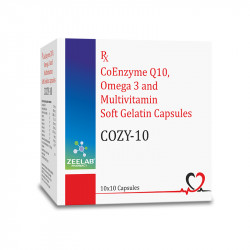
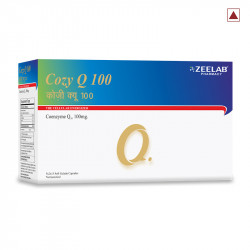
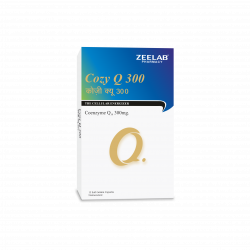
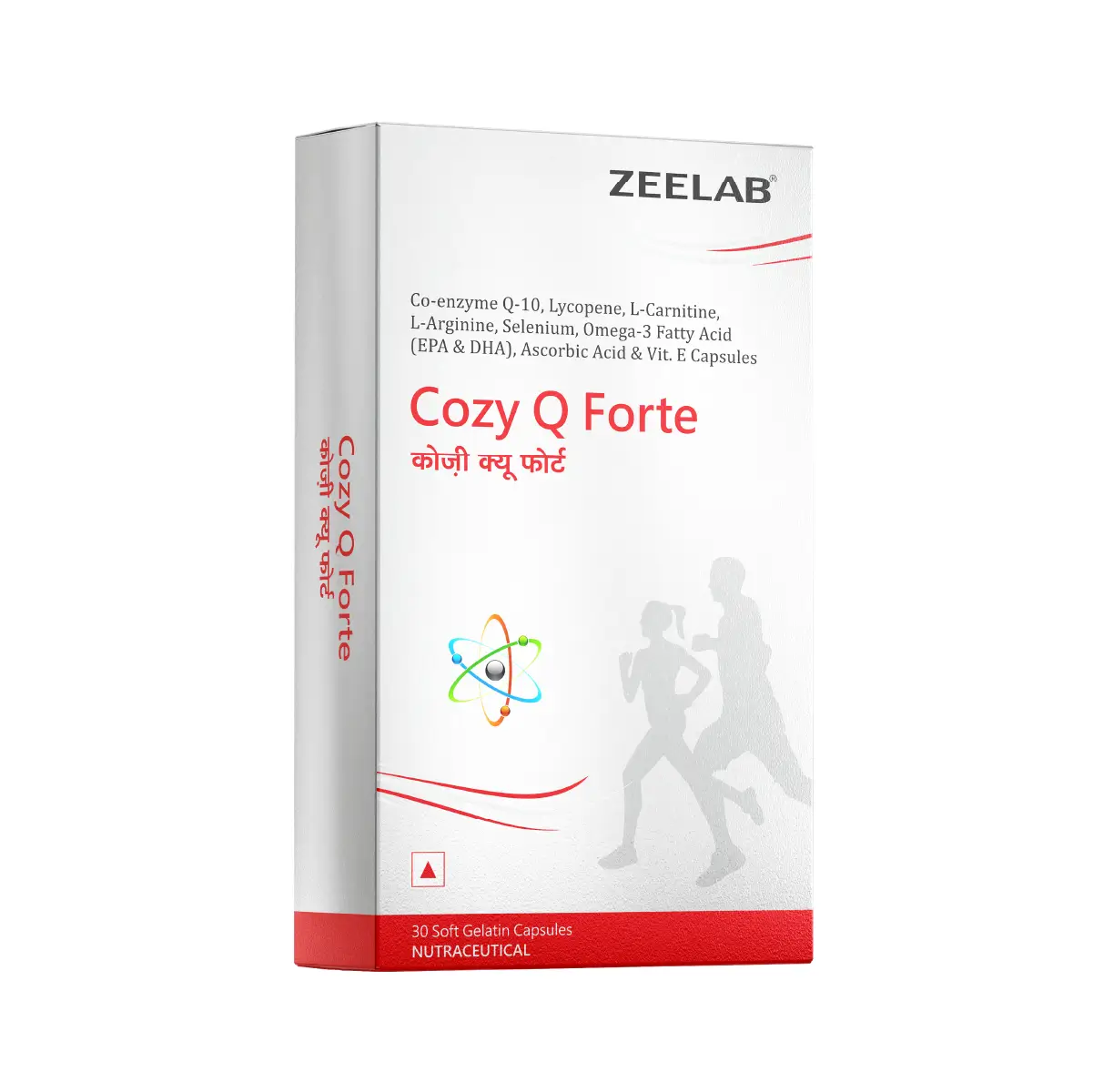
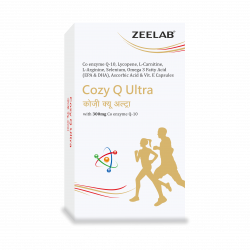















 Added!
Added!